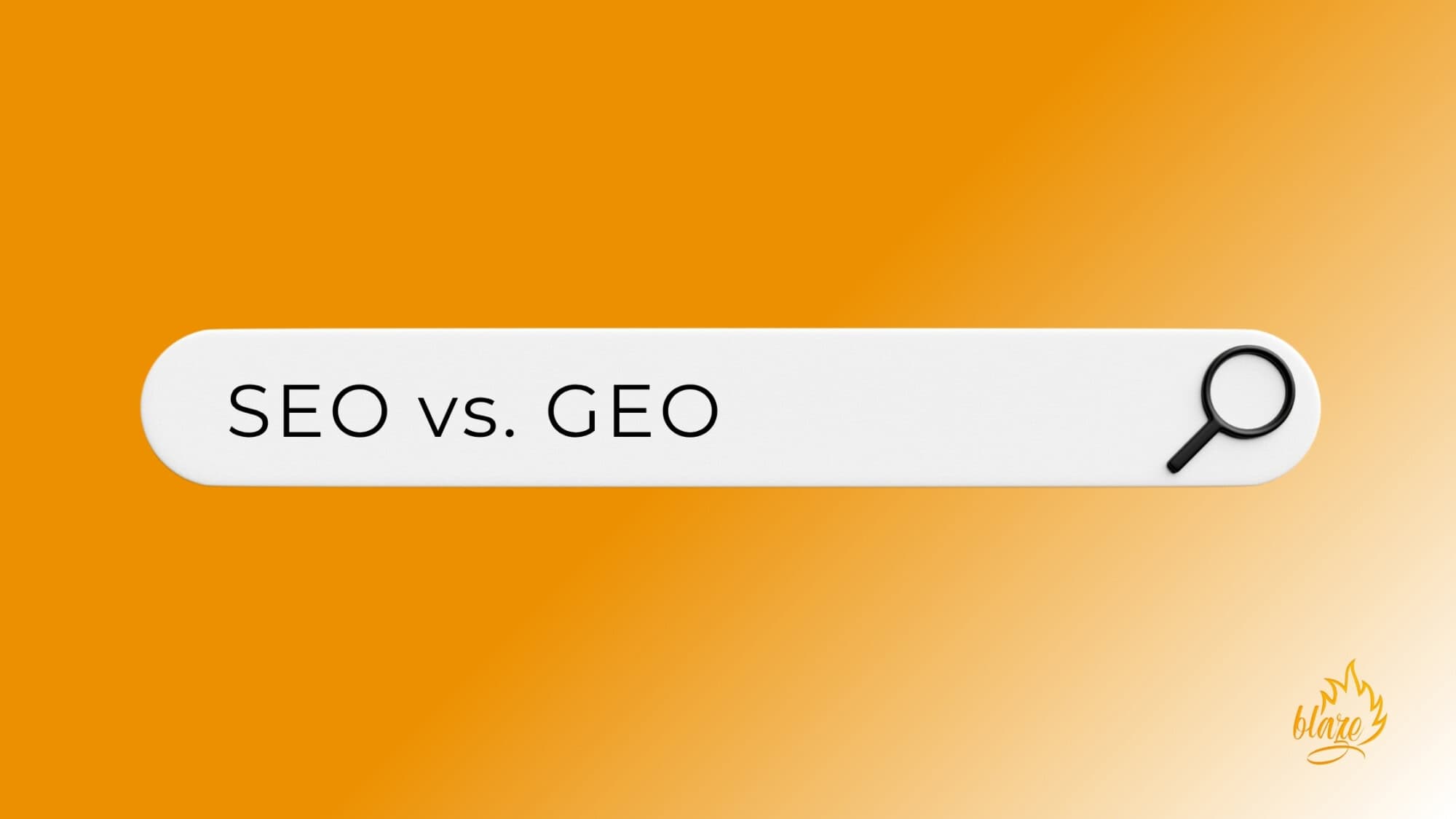As the weather cools and everything turns witchy and pumpkin spice-themed, October, and more specifically Q4, always feels like a natural time to rekindle what’s working and refresh what could use a little spark. For many businesses, that spark begins with their digital presence, specifically their website, and how SEO and GEO are shaping their search marketing performance.
We’ve all talked about SEO for years, but now there’s a new player in the mix called GEO. And while the names sound similar, they work in slightly different ways to help your business show up where your customers are looking.
So let’s dig into what these two strategies mean and how they work hand in hand to keep your business visible in both traditional search and the growing impact of AI search.
Making Sense of SEO and GEO
SEO, or Search Engine Optimization, focuses on helping your website rank in places like Google and Bing. It’s the foundation that gets people to click through to your site when they’re searching for services, answers, or local businesses.
GEO, short for Generative Engine Optimization, is the next evolution. It’s about making you are content-friendly for AI-driven tools such as ChatGPT, Claude, and Google’s AI Overviews. These platforms are becoming new sources of answers. When your content is optimized for them, your business has a better chance of being cited or mentioned directly in those AI responses. If not, this can have an immediate impact. Take, for example, Google’s algorithm change and implementation of its expertise, authoritativeness, and trustworthiness (E-A-T) model that affected not only Reddit’s traffic but also its stock value. As user-generated content, Reddit didn’t meet Google’s criteria, which resulted in a significant drop in traffic to the site and, therefore, shareholder confidence.
Think of it this way. SEO drives traffic to your website. GEO puts your name in the conversation when people ask AI tools for recommendations. Your brand needs to position itself for both.
How SEO and GEO Work Together
Even though they have different focuses, SEO and GEO complement each other beautifully. SEO ensures your content is well-structured, keyword-optimized, and built for speed and usability. GEO builds on that foundation by rewarding content that is clear, factual, and credible, so AI tools can easily understand and reference it.
Imagine you run a Cybersecurity company in California. Traditional SEO helps you show up when someone searches “Cybersecurity support near me” or “managed services California.” GEO steps in to help your business appear when someone asks ChatGPT, “Who are the top Cybersecurity companies in California?”
Or picture an Arizona law firm. SEO keeps your firm ranking when people search “family lawyer in Phoenix.” GEO makes sure your expertise is recognized when someone asks an AI assistant, “What are the best family law firms in Arizona?”
And for a construction information management company supporting builders in Florida, SEO brings visitors to your site when they search “virtual design construction” from a location in Ocala. GEO helps your name surface in an AI-generated answer about “who provides systems for luxury home builders in Florida?”
SEO and GEO work together so your business can be found both in search results and in the new wave of AI answers that people increasingly rely upon.
Why GEO Isn’t Replacing SEO
There’s a lot of buzz about GEO being the future of search, but don’t worry too much about that yet because SEO still does most of the heavy lifting.
Recent data shows that while traffic from AI chatbots is rising, it’s still small compared to traditional search engines. A study by OneLittleWeb found that only about 3% of visits came from chatbots, while nearly eighty percent of users still rely on Google or Bing when searching for information.
So even though GEO is growing fast, SEO remains the core strategy that drives your website traffic and leads. GEO supplements this by expanding your reach to new digital spaces where people are asking questions and getting AI-generated answers.
How to Get the Best of Both Worlds
You don’t need to overhaul your website to make it work for both SEO and GEO. A few simple steps can help your content stay competitive across all search platforms.
Start by reviewing your best-performing content. Make sure your pages are clear, structured, and easy to read. Lead with the most important information at the top, using headings to make it easy for both humans and AI to scan.
Next, include verifiable facts, stats, or expert quotes to show authority and credibility. AI tools prefer trustworthy, well-sourced content.
And don’t forget your traditional SEO basics. Keep your site fast, secure, and keyword optimized. Maintain your backlinks and local listings. These fundamentals still matter, and they make your site more appealing to both search engines and AI models.
Keep Growing with Blaze’s SEO Search Light
As you probably know, Blaze is first and foremost a branding agency. Branding is at the heart of everything we do. We begin by crafting your brand identity and voice, integrating them into your visual and verbal communications to resonate with your Ideal client. We then extend this energy into your website and content marketing, creating a cohesive online and offline presence.
From there, we can help your business stay visible across every type of search, from Google to AI-powered platforms. Our monthly SEO Search Light service keeps your online presence shining bright. It includes keyword optimization, local search, regular audits, and continuous updates, ensuring your website always performs at its best.
We fully manage your onsite and off-site SEO, allowing you to focus on running your business while we handle the ongoing improvements that make a real difference in how people find you online.
We want your online presence to shine from your nearby neighborhoods to AI-powered platforms. Are you ready to light up your search strategy in an authentic, credible way? Let’s chat!


 Sign up for Spark, an e-newsletter from Blaze.
Sign up for Spark, an e-newsletter from Blaze.